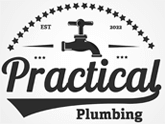Low water pressure can be frustrating and inconvenient, but fortunately, it is usually an easy problem to fix. If you are experiencing low water pressure and are looking for a professional plumbers Greeley, CO, area, Practical Plumbing can help.
Here are a few of the main causes of low water pressure and steps you can take to fix the problem:
- Clogged pipes: If your pipes are clogged with debris, it can reduce the flow of water and lead to low pressure. To fix this issue, you can try using a plunger or snake to clear the clog. If the problem persists, it may be time to call in one of our professional plumbers.
- Leaks: Leaks in your pipes or fixtures can also lead to low water pressure. You will need to locate and repair the leak to fix this issue. If you are unable to find the source of the leak, a professional plumber can help.
- Water meter issues: If your water meter is not functioning properly, it can lead to low water pressure. In this case, you will need to call your local water provider to have the meter repaired or replaced.
- Mineral build-up: Hard water can leave behind mineral deposits in your pipes, which can reduce the flow of water and cause low pressure. To fix this issue, you can try using a water softeners Greeley, CO or call Practical Plumbing in Greeley, CO, to address the problem.
If you are experiencing low water pressure and are unable to fix the problem on your own, the team at Practical Plumbing is here to help. Our skilled technicians can diagnose and fix the issue quickly and efficiently, ensuring that you have the water pressure you need.
Types Of Water Softeners
If you decide to use a water softener, you should know that there a several options. They all remove minerals that cause water hardness, such as calcium and magnesium, from household water supplies, including:
- Ion exchange water softeners: These use a bed of resin beads to remove calcium and magnesium ions from the water, replacing them with sodium ions. The water softener must be periodically regenerated with a salt solution to remove the collected minerals and restore the resin beads to their original state.
- Salt-free water softeners: These do not use salt to soften the water but instead use a physical or chemical process to alter the minerals in the water so that they do not cause hardness.
- Magnetic water softeners: These use a magnetic field to alter the minerals in the water, reducing their ability to cause hardness.
- Reverse osmosis water softeners: These use a semi-permeable membrane to filter out minerals and other impurities from the water.
- Electronic water softeners: These use electronic fields to alter the minerals in the water, reducing their ability to cause hardness.
- Portable exchange water softeners: These use a tank of resin beads that can be exchanged for a fresh tank when the beads become saturated with minerals. This type of water softener does not require a connection to a household water supply and can be used in several locations.
Practical Plumbing can help you determine the best water softener for your needs or take care of it ourselves. We also offer water heater replacement in Greeley, CO, area if the issue is beyond repair. Contact us at (970) 380-5863 to schedule an inspection or repair or to learn more about our services.





